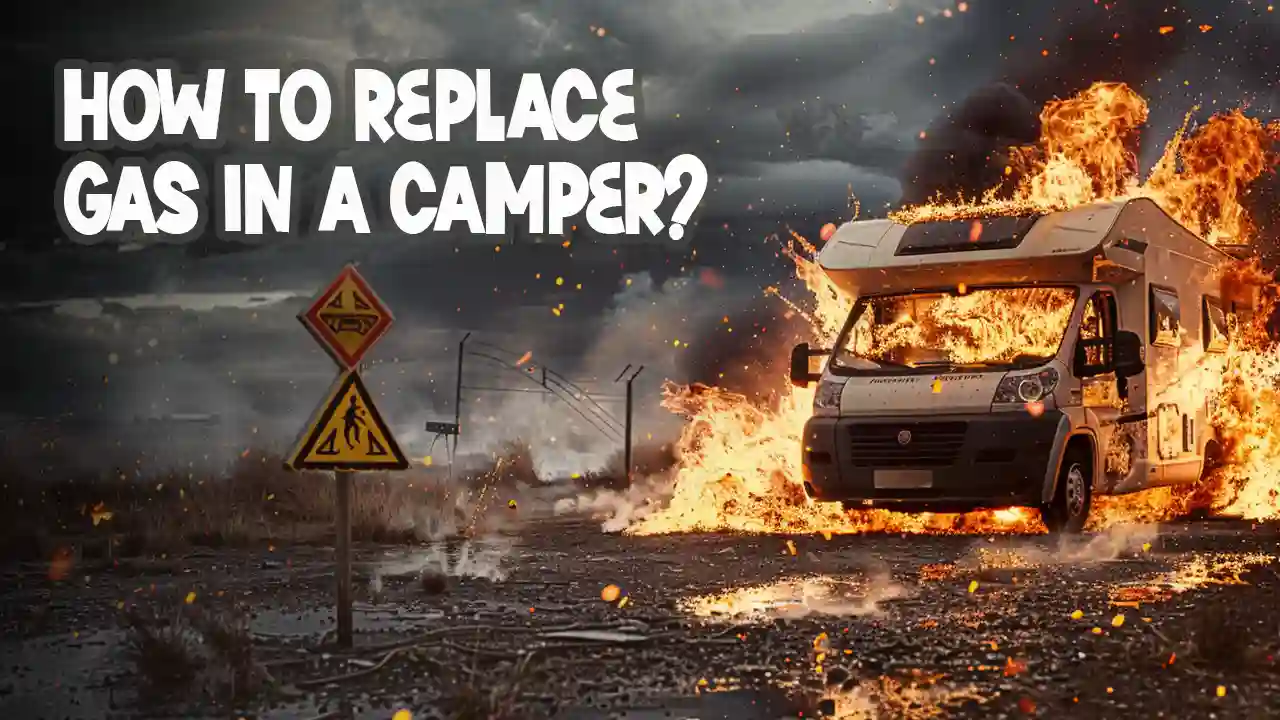
Is a Gas-Free Camper Possible?
Introduction
Did you know that when camper vans first emerged, gas was the only option for cooking and heating? Yes, it was the standard, so most RVs, including our beloved Edouard, adopted this solution. But now, with advancements in solar panels and powerful batteries, it’s entirely feasible to say goodbye to gas. In this article, we’ll explore how to transform the different systems in your RV — cooking, heating, hot water, and refrigeration — to run on solar and electric power. Is it possible?
Why Replace Gas in Your Van?
Safety: Using gas in a camper van comes with significant risks. Leaks and fire hazards are major concerns and can unfortunately happen.
Convenience: Beyond safety, convenience is a key factor. Refilling gas bottles and getting installations certified can be a real headache. Each country has its standards and connectors, and finding the right adapter can be frustrating.
Space: Storing gas requires substantial space and specific installations, including sealed compartments to ensure safety. These constraints take up valuable space in an already limited area like a camper van.
Environment: Lastly, and importantly, is the environmental impact of gas. Given the greener solutions available today, continuing to use gas seems counterproductive. Green technologies, such as lithium batteries, offer a cleaner and more sustainable alternative, reducing our ecological footprint during our travels.
How to Heat Your Camper Without Using Gas
Proper insulation is crucial to maintain warmth in a camper. Effective insulation minimizes the need for heating, regardless of the climate. However, when winter arrives or if your travels take you to colder regions, heating becomes essential. So, how can you avoid gas and opt for effective heating solutions?
Diesel Heating
Diesel heating is a robust option, often more cost-effective in the long run. Plus, it has an incredible advantage: your vehicle runs on diesel, which is far easier to find than gas. Particularly suited for very cold environments, this system requires a significant initial investment but proves economical compared to the continuous expenses of gas. If you’re concerned about odors or diesel vapor leaks, simply install your heater outside (under your van, for example), and only let the hot air duct enter.
Electric Solutions and Traditional Methods
- Heated Blankets: Simple and energy-efficient, these blankets are ideal for chilly nights. They consume little electricity and can be powered by lithium batteries, ensuring comfort and warmth without the complications or dangers of gas.
- Moisture: As we explain in our article on living in a van during winter, perceived cold can be more unpleasant than the actual cold, often caused by humidity. Don’t be afraid to frequently ventilate your van to expel moisture generated by your body and breath.
Opting for electricity as the main or supplementary source of heating offers notable advantages: cleanliness, safety, and ease of management.
How to Have Hot Water Without Gas in a Van?
Even though nomads may have a reputation for not showering much, they do bathe like everyone else, preferably with hot water. Typically, you find a small water heater or RV boiler that combines heating and hot water, but there are indeed 100% electric water heaters.
Electric Water Heater
Electric boilers, though still somewhat pricey, stand out for their reliability. While the initial investment may seem high, it is worth it, especially with the advancements in lithium batteries.
Mini Domestic Water Heaters
For moderate hot water needs, why not opt for a mini 10-liter water heater? Adapted from residential to nomadic use, these little gems can be easily installed in your camper and represent an economical solution, especially for those who don’t want too much hassle.
Boat Heat Exchange Systems
A lesser-known system is the heat exchangers, popular in boating but equally effective in a van. They use the engine’s heat to warm the water, which is not only clever but also energy-efficient since it requires no extra energy while driving. Well insulated from the outside, these systems can keep water at a pleasant temperature for several hours.

What to Use Instead of Gas for Cooking?
This might be the most crucial aspect – food, lol. Even in the city, this question arises because cooking with fire offers a precision that is hard to replicate with other types of energy. However, we are not in a “Top Chef” scenario; we are traveling. For daily cooking, gas can indeed be replaced by induction cooktops.
Induction Cooktops
Induction cooktops are at the forefront of cooking technology without gas. Their main advantages lie in their enhanced safety and energy efficiency. They heat faster and with more precision than traditional cooktops, thus avoiding energy waste and reducing accident risks. Additionally, they are easy to clean, a crucial advantage in a confined space. While the initial cost may be higher than gas equipment, long-term savings make them a wise investment. For example, a 1500-watt induction cooktop theoretically consumes only 20 amps for 10 minutes of full-power use, but in practice, actual use is often much lower, making the energy cost very affordable. Finally, an important detail: if you want to get your vehicle certified as VASP (a certification system in France, check if there is a similar system in your country), make sure to get VASP-compatible induction cooktops!
Multicooker
Slightly less recommended, electric multicookers and steam cookers can be alternatives. They allow for a wide variety of preparations without constant supervision, ideal for those who want to enjoy their travels without spending hours cooking.
Diesel Cooktops
Yes, as strange as it may sound, diesel cooktops do exist. Similar to the heating systems discussed earlier, you only need your fuel reserve to heat your food (that rhymes). Unlike solar, diesel cooking takes longer, which will extend the cooking time and increase the cost.
Which Fridges Work Without Gas in a Van?
If you’re considering adding a refrigerator to your camper van, you might be wondering whether to choose an electric model or a three-way fridge (12V, 220V, gas). Here’s some information to help you make an informed choice.
Electric refrigerators stand out for their enhanced safety and energy efficiency. Operating either on 12V or 220V, they integrate perfectly with a system powered by solar panels or batteries, minimizing the risks associated with gas installations. Moreover, their energy needs are mostly noticeable when temperatures rise or during frequent openings. Fortunately, their modern design with efficient compressors significantly reduces energy consumption. For instance, a typical model might use about 2 to 3 amps per hour while running, but this usage can drop considerably by keeping the fridge closed as much as possible and using it in a cool environment.
Electric Coolers Fridge
There are now battery-powered electric coolers, like the Ecoflow cooler we’ve previously discussed on this site. Coolers have the advantage of being less bulky, and this particular model can even make ice while running on its battery, which helps alleviate the electrical load while keeping your products fresh at a comfortable temperature to avoid any issues.




